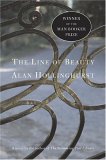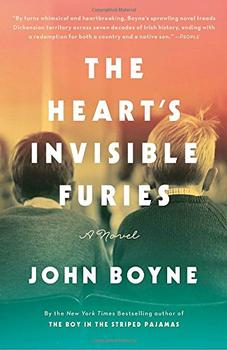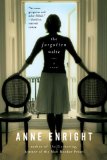BookBrowse Review
BookBrowse
The Line of Beauty, winner of last year's Mann Booker prize, is
Hollinghurst's fourth novel following The Swimming-Pool Library (1988), The
Folding Star (1994) and The Spell (1998). Hollinghurst has
gained a reputation for his elegant descriptions of gay male life and pitch-perfect
prose, but here his emphasis is more on, what he sees as, the vast divide
between the ruling class and everyone else. The book is
divided into three parts, all set in London during the 1980s, the decade defined
in many ways by Margaret Thatcher (Conservative/Tory Prime Minister from
1979-1990). In the first part, set in 1983, we meet our protagonist Nick
Guest, freshly arrived from Oxford and living in the house of Tory MP Gerald
Fedden, at the request of Gerald's son Toby. Nick quickly becomes the
confidante of Catherine, Toby's manic-depressive sister, loses his virginity to
a black council worker and enters a world of drunken, drug-laced parties at
ancestral homes attended by top financiers and politicians. During the
next four years we follow Nick as he goes (in the words of Kirkus Reviews) 'from
a virginal 20-year-old to a wizened 24-year-old'.
As many reviewers point out, Nick is less interesting as a character as he
is as an observer, much as Nick Carraway in The Great Gatsby is more
interesting for his observations of the 'careless people' than as a character in
his own right. Reviewers compare The Line of Beauty to the writing
of Trollope, Waugh, Proust and Henry James (the latter comparison is
unsurprising considering the 400-plus pages of the novel are littered with
references to Henry James).
It has received glowing reviews from many; for
example The Observer (UK) describes it as 'a classic of our times… The work of a great English stylist in full
maturity; a masterpiece'.
..continued
Full Review
 (303 words)
(303 words)
(Reviewed by BookBrowse Review Team).
Media Reviews
Sunday Telegraph
The book is Jamesian in the best sense; indeed, in some ways, Hollinghurst surpasses his master. His prose is both super-elegant and super-succinct there is none of the windbaggery of the later James novels. If it does not make the Booker short-list, I will be truly astonished.
The Washington Post - Michael Dirda
Edmund White has said that Alan Hollinghurst writes the best prose we have today. I might not go that far -- White himself is no slouch with a sentence -- but if you value style, wit and social satire in your reading, don't miss this elegant and passionate novel.
GQ
Vast scope... smart, funny, and for all its vividly engaging ways, a pretty sound document of the times.
Colm Toibin, The Guardian
In Alan Hollinghurst's novel The Line of Beauty, the great tradition of English public, political narrative, as perfected by Trollope, meets the sculpted, poetic and interior narrative as perfected by Henry James. The result is intriguing, like reading gossip in beautifully made sentences with extraordinary insights into motive and nuance, allowing all the time for comedy.
Daily Telegraph
A magnificent novel... There are literally thousands of impeccably nuanced touches. Hollinghurst, as Henry James said, is one on whom nothing is lost. He is living proof that the vaulting claims made by the Master on behalf of the novel - the force of beauty and its process - still hold good today.
Evening Standard
An important novel of twentieth-century manners, deliberately provoking comparisons with not just Henry James but with Trollope, Waugh and Proust. Astonishingly, The Line of Beauty emerges with credit from these confrontations... a richly literate, ambitious piece of work. It makes a lot of contemporary fiction seem thin and underachieving... deserves to be widely read.
Financial Times
Must rank among the funniest [novels] ever written about Thatcher's Britain, while remaining one of the most tragically sad.
Independent on Sunday
[Hollinghurst's] brilliant recreation of that bigoted, nepotistic, racist, callous and mean-spirited epoch is timely. If Thatcher's London has rarely been better done by a British moralist, Hollinghurst loves the city more than most. And on the note of love of London, and of life, this fabulous novel ends.
Scotland on Sunday
Stunning... The Line of Beauty is quite simply a joy to read. It is solid and traditional, beautifully crafted - the sort of book Henry James might have been proud of... It is a quiet masterpiece.
Spectator
Wonderful... almost unbelievably well-written - 600 pages of finely wrought but tough, close-in observation. Negotiating cocaine, adultery, homosexuality and Margaret Thatcher in a serious novel requires a perfect touch, and Hollinghurst has shown that he has it. In its dazzling, very contemporary way, the book is tragic.. But it is also consistently funny.
Sunday Times
A novel so exquisitely written that at times it feels almost as if it could dispense with plot and characters and exist on a plane of pure perception and connotation. It doesn't, of course, and it ably depicts the high-days of a boom society and the ambiguous charm of being both insider and cuckoo in the nest. But its delights and rewards extend beyond its comic or documentary achievements and are to be found in its author's almost uncanny apprehension of the world he observes... These are lines of beauty that will last long beyond the surface shocks and excitements of the novel's story.
The Guardian - Zadie Smith
The best English novel of the year so far is Alan Hollinghurst's The Line of Beauty
The Observer
A classic of our times… The work of a great English stylist in full maturity; a masterpiece.
The Times
Luminous... [an] astonishingly Jamesian novel, a crafty, glittering, sidelong bid by a contemporary master of English prose to be considered heir to James himself. For a novel that spans only four years, 1983 to 1987, it seems to encompass a world as capacious as any in a James novel.
Times Literary Supplement
There is something memorable on every page... there is much to savour in The Line of Beauty, not least its humour, a shivering yet morally exacting satire that leaves no character untouched.
Publishers Weekly
Among its other wonders, this almost perfectly written novel delineates what’s arguably the most coruscating portrait of a plutocracy since Goya painted the Spanish Bourbons. To shade in the nuances of class, Hollingsworth uses plot the way it was meant to be used—not as a line of utility, but as a thematically connected sequence of events that creates its own mini-value system and symbols... Widely praised for his three previous novels, Hollinghurst is primed for even greater acclaim and sales with this masterful volume, the latest in a wave of Jamesian novels.
Kirkus Reviews
Nick is less interesting as a character than as an observer His youthful affairs do gain gravitas as the '80s progress under the specter of AIDS, but over the story's course he goes from a virginal 20-year-old to a wizened 24-year-old. More fascinating are Hollinghurst's incisive depictions of the brilliance and ease that insulate and animate the Feddens - especially the witty and difficult Gerald and the spectacular mess that is Catherine, and the crushing realization that Nick, unlike those around him, does not have the casual luxury to crash up his own life and survive. A beautifully realized portrait of a decade and a social class, but without a well-developed emotional core.
 Edmund White
Edmund White
Alan Hollinghurst writes harsh but deeply informed social satire from within, just as Proust did. He writes the best prose we have today.
 Geoff Dyer
Geoff Dyer
For once the jacket blurb is not hyperbole—it really is his finest novel.
Reader Reviews
Nirmal Gerow
The Line of Beauty "The Line of Beauty" is one of the most amazing books I have read. The storytelling is wild, understated, humorous and devastating.
Nick Guest is heartbreaking in his following his line of beauty, and acceptance of all things - from his duties,...
Read More
Dhruv Kandhari
The Line of Beauty ‘The Line of Beauty’ is a novel of philosophical, subliminal depth and beauty that has sacred prose with a poetic voice rarely heard or written, it has a harmony that doesn’t only satiate the intellect, but touches the reader’s soul in a way many ...
Read More
Sarah
I liked this book because the language is exquisite (of a pianist he writes: She had a lot of temperament and a terrifying left hand.) I liked it because as the reader, to understand the characters you had to behave like the main one - Nick Guest - ...
Read More
Jan
Very disappointing I had read good reviews of this book and was delighted to be given a hard back copy for Christmas. After 80 pages I put it to one side because I wasn't enjoying the writing, the plot or the characters - a nice cover only takes you so far. Then a ...
Read More
Write your own review!

 (303 words)
(303 words)


